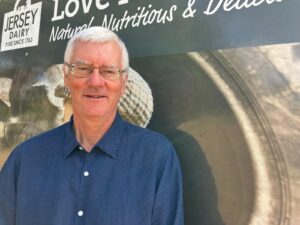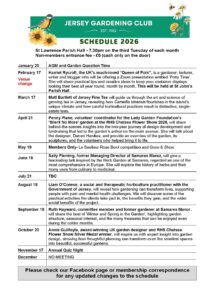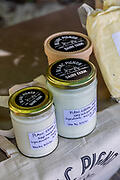
A speech by the chairman of the Jersey Milk Marketing Board, Phil Le Maistre, given at the annual Jersey Farming Conference on 6 November 2025. Slightly edited
Last year, we heard some particularly encouraging news from Alex Bartlett, of Albert Bartlett Ltd, following their acquisition of the Jersey Royal Company. They committed to investing in marketing and advertising initiatives, and unveiled their new TV commercial, which aired throughout this year’s potato season. Their efforts didn’t just promote the Jersey Royal potato — they promoted the Island of Jersey itself.
The key message, is that they did something bold. They believed in the brand they had acquired and invested in it with confidence. That’s a mindset we can all learn from, whether it’s in potatoes, dairy, or any other agricultural enterprise.
When I travel and people ask where I’m from, and I say I am from Jersey, I often get a variety of reactions—some of which maybe the same you:
‘Ah, New Jersey?’ they say. ‘That’s a funny accent you have—it doesn’t sound American.’
Or ‘Tax exile!’ comes up occasionally, ‘You must be rich.’ And then I tell them, ‘I’m a farmer!’
‘Bergerac?’ depending on the generation; it may be the old or the current series
Jersey Royals often come up if I am in the UK. ‘My favourite potato,’ many say!
But perhaps most universally, and in almost every corner of the world, the thing people associate with Jersey is the Jersey cow.
It’s remarkable when you think about it: two of Jersey’s most famous icons and agricultural brands — the Jersey Royal potato and the Jersey cow—both have international recognition.
So, I want to share my thoughts on what this means for us farming in Jersey, why it matters, and what we need to be doing to protect and promote the Jersey cow.
The Jersey breed was established in the Island after the States voted to ban the importation of cattle way back in 1763. The formation of the Jersey Herd Book in 1866 was the foundation on which the Jersey breed is based, both in Jersey and worldwide.
The very first Jersey cows to be exported, were taken by emigrants leaving the Island — not for trade, but simply to provide milk during their long sea voyages.
It wasn’t long before the Jersey cow’s gentle nature, and the exceptional quality of her milk became well known. Soon, farmers began selling animals to many different countries, and the Jersey cow’s reputation started to spread.
For the past 150 years or more, the Jersey cow has truly been the Island’s unofficial ambassador, carrying the name of Jersey across the world.
I learned last week that in 1959, the runway at Jersey Airport was extended by 300 feet to accommodate a Pan American DC6 Freight Aircraft. This was the largest aircraft to land in the island at that time and it was used to transport cattle to America. This extension of the runway allowing larger aircrafts to land was of considerable benefit to the developing tourism industry at that time and is another impact that the Jersey cow has had on the Island.
Did you know there are now over 4 million Jersey cows in more than 100 countries around the globe?
You may ask yourself — why is that?
Is it because Jersey milk contains 18% more calcium and 20% more protein than other milks?
Perhaps it’s because Jersey cows produce rich, creamy, and nutritious milk with a lower carbon footprint.
Could it be their remarkable ability to adapt to a wide range of climates?
Or maybe it’s their calm, placid nature, which makes them easier to manage?
I would say it’s all of these reasons combined that have made the Jersey cow the second most popular dairy breed in the world today.
There’s perhaps no greater example of the Jersey cow’s global impact than in Africa, through the Jersey Overseas Aid and Royal Jersey Agricultural and Horticultural Society’s flagship, Dairy for Development programme.
By crossbreeding indigenous cattle with Jersey bull semen, farmers have been able to significantly increase milk yields, improving both food security and family incomes.
Just a few weeks ago at the Jersey Arts Centre, there was an inspiring presentation from some of the partners working alongside Jersey Overseas Aid. The key findings were clear — while many African countries have experimented with other breeds for crossbreeding, they all came to the same conclusion: the Jersey cow is by far the most suitable and successful.
It’s a truly remarkable initiative — one that shares expertise, resources, and opportunity, creating a ripple effect that will benefit communities for generations to come.
Everything I’ve just highlighted began right here, with our Jersey cow, developed over generations, supported by a strong and viable dairy industry on the Island.
Here in Jersey, farming has shaped our countryside, our landscape, our heritage, our culture, and even our international identity.
For everyone involved in the Jersey dairy industry, and I’m sure for many islanders too, it would be unthinkable not to see our iconic Jersey cow grazing in her Island home.
To ensure the long-term future of the Jersey cow, we need a viable and sustainable dairy industry, and that is exactly what the strategy of the Jersey Milk Marketing Board aims to achieve.
We now manufacture over 30 different product lines through our factory each week — quite an achievement, but one that also adds a lot of complexity to running Jersey Dairy.
Local food security remains critical and Jersey Dairy’s priority is to meet local demand first, ensuring a wide range of fresh, high-quality dairy products for Islanders. Once local needs are met, any surplus milk is processed into products for export markets.
Over the past 12 months, Islanders have consumed more than 14.5 million pounds of dairy products. And while bad weather might occasionally cause empty shelves in the shops, you can be assured that the dairy section will always be well stocked.
Currently, about 50% of our milk is used locally. To support the long-term sustainability of our industry, we have also developed export markets for surplus milk.
Exporting our products is essential, as the local market has been declining by 1–2% each year.
There are several reasons for this decline:
The growing popularity of milk alternatives,
Fewer visitors to the Island, and
Changing consumer habits overall.
While a 1–2% decline may sound small, over 15 years it adds up and local liquid milk sales have fallen by around 1.4 million litres since we moved to the new factory in Trinity in 2010.
It’s worth noting that this trend isn’t unique to Jersey — the UK market is seeing a similar 2% annual decline in milk consumption.
Over recent years, Jersey Dairy has taken a proactive approach to reverse this trend, running several campaigns to promote the benefits of drinking milk:
We ran the Bring Back Breakfast campaign in 2019 which highlighted the importance of including milk and dairy at breakfast time.
We launched My Milk campaign in 2021. A fun, family-friendly token initiative, where children could collect milk carton tokens to receive a free milk flask — it proved so popular we ran it for two years!
In 2023, we introduced our farmers’ photos on the milk cartons to strengthen the connection between consumers and local producers, and to remind people that Jersey Dairy is a farmer-owned cooperative.
This year we launched Fuelled by Milk, our most recent sports campaign, promoting milk as the ultimate energy and recovery drink. We attended school sports days, local sporting events, and even had our mascot Carlton take part in the Mascot Mile!
All of these initiatives aim to boost local milk consumption, and I’m pleased to share that over the past 12 months, the rate of decline has slowed to just 0.6%.
To secure the future of the industry, we’ve had to be proactive and forward-thinking. Developing export markets was key to our long-term viability.
One of the best decisions Jersey Dairy farmers ever made was in 2010, when we sold the Five Oaks site in St. Saviour and moved to a modern, purpose-built facility at Trinity.
This new factory has enabled us to expand our product range and supply both local and international markets. In 2010, we launched our UHT product range to the UK and beyond.
We supply a wide network of UK wholesalers with soft mix ice cream, and we’ve built strong distribution channels across the whole of the UK.
In recent years, we’ve also expanded into casual dining restaurants, supplying ice cream and thick-shake UHT products for dessert menus.
This represents an important strategic shift for Jersey Dairy — moving toward customers with year-round demand, unlike the seasonal peaks seen in soft mix wholesaler sales.
Jersey Dairy now supplies some major brands, including Nando’s, Popeyes, and Angus Steakhouse.
A major part of our export strategy has been to build close relationships with key partners and develop bespoke recipes tailored to their brands.
Examples of some of our customers include:
Hotel Chocolat: We produce their ‘Ice Cream of the Gods’, made by infusing their cocoa nibs into Jersey milk for a unique flavour experience.
Other private label partners include:
New Forest Ice Cream – a family-run business for whom we produce a premium soft ice cream recipe.
Colicci – a café brand operating in London’s Royal Parks, using their own premium recipe with Jersey cream.
Shake Shack: a casual dining restaurant for which we recently developed a frozen custard recipe. When you next go through Gatwick airport, please call into the Shake shack restaurant and try one of the custard deserts developed here in Jersey
Our fastest growth in recent years has come from UHT recipe products. Jersey Dairy has built a strong reputation for quality, service, and innovation, becoming recognised specialists in UHT bespoke projects for the food service sector.
A really exciting new development is our expansion into France, we’ve been taking everything we’ve learned from the UK market and applying it there.
We’ve partnered with MYLFC, a French company, which supplies ice-cream dispensing machines to restaurants. They have been introducing their customers to our Jersey Gold ice-cream mix, and the response has been really encouraging
The success is driven by the quality and richness of our milk — naturally higher in protein, calcium, and nutrients — combined with premium ingredients, including high-quality natural vanilla.
This is an exciting development for Jersey Dairy. Having stock held at a depot just outside Lyon means we can now deliver samples to potential customers much faster. Previously, post-Brexit paperwork delays could hold things up by around two weeks.
MYLFC also has the warehouse capacity to handle full container loads as sales continue to grow, improving both efficiency and logistics costs per unit.
In our first year, we sold around 80,000 litres of soft mix ice cream in France — and this year, we expect that to be over 120,000 litres.
With France being so close to Jersey, it makes perfect sense to expand our presence there and explore opportunities for all our UHT products. Even better, this partnership with MYLFC opens the door to other European markets.
Let’s take a quick look back at our journey since moving to the new factory in 2010.
In our first year of trading:
Milk intake: 12.9 million litres UHT export sales: 503,000 litres
Fast-forward to the past 12 months:
Milk intake: 14.7 million litres
UHT export sales: 5.2 million litres
The growth and progress over the last 15 years have been remarkable. During this time, we have:
- Increased recognition of the Jersey Dairy brand,
- Developed new and innovative products for a wide range of customers,
- Improved milk quality, achieving a 12-month shelf life on UHT products (most competitors manage only 6–9 months),
- Built strong partnerships with key customers, and
- Expanded both our product range and our customer base.
From an Island once known for exporting Jersey cows across the world, we are now proudly exporting our products — to places as far-flung as the Falkland Islands, South Korea, Hong Kong, the Seychelles, France, and the UK.
The Jersey cow has been promoting the Jersey name around the world for years and now we have Jersey Dairy products made in her island home doing the same.
Over the years The Jersey cow has given so much more to the Island than just milk It’s an incredible story, and long may it continue.
None of this would have been possible without the support of our loyal local customers .the hard work of everyone who works at Jersey Dairy and the dedication and long hours that everyone puts in every day on all of our dairy farms. I should like to say a big thankyou to everyone that is involved with the dairy industry,
We’re also deeply grateful for the support from Government in recent years — in particular, Deputy Kirsten Morel and Deputy Steve Luce.
The introduction of the Rural Economy Framework in 2022, led by John Vautier and his team, was a real turning point for our sector — as was the States’ landmark decision to increase rural sector funding, passed with 43 votes in favour.
Working together is starting to deliver real results, but it’s vital that we continue to support our rural economy.
As we approach the 2026 election, it’s up to all of us who care about farming to ensure that:
- Farming appears on candidates’ manifestos, and
- We support candidates who show real support for agriculture.
So, in 2026, let’s all vote for farming.




